Applicants and Licensees / Responsible Vendor Training
Responsible Vendor Training
Proper Agent training is critically important to the compliance and success of Marijuana Establishments (MEs), Medical Marijuana Treatment Centers (MTCs), and Independent Testing Laboratories (ITLs), as well as the public safety, health, and welfare of consumers, patients, caregivers, and constituents in Massachusetts.
The Responsible Vendor Training (RVT) certification program operates within the Licensing Department. This program highlights the Commission’s mission to effectively implement a safe cannabis industry in the Commonwealth and belief that proper training is a critical part of a Marijuana Establishment’s success.
Marijuana Establishment Agents are required to complete RVT training to perform their job functions. Certified RVT vendors offer in-classroom, virtual classroom, and online modules, that covers all topics identified in 935 CMR 500.050(2)(b). [See 500.105(2)]
This page provides information on the following:
- RVT Program Curricula Offered by Certified Responsible Vendor Trainers (RVT Trainer)
- Application Requirements and Process to become a Certified RVT Trainer
- Ongoing Requirements of Certified RVT Trainers
- RVT Requirements for MEs, MTCs, ITLs, and Agents
In addition to this page, the Commission has the following sources of information available:
RVT Program Curricula
RVT Trainer applicants may apply to become certified for any of the three different curricula offered by the Commission, pursuant to 935 CMR 500.105(2)(b) and 501.105(2)(b):
- Basic Core Curriculum;
- Delivery Core Curriculum; and
- Advanced Core Curriculum
Basic Core Curriculum (BCC)
The BCC is a required four-hour training for Agents of MEs, MTCs, and ITLs that may occur in-person or virtually. At least two hours of this training must be instructional time.
The BCC training covers topics such as:
- Key state laws and regulations affecting Agents;
- Diversion prevention;
- Prevention of sales to minors;
- Effects of marijuana on a person, including recognizing signs of impairment; and
- How to check proper identification.
All Agents are required to pass a written test with a score of 70% or higher to successfully complete the BCC. Non-English speaking or writing Agents may be offered a verbal evaluation or test as an alternative.
Delivery Core Curriculum (DCC)
In addition to completing the BCC, all Agents acting as delivery employees for adult-use delivery licensees, microbusinesses with a delivery endorsement, or MTCs that perform delivery operations are required to successfully complete the DCC prior to delivering marijuana and marijuana products to consumers or patients. Agents planning to perform deliveries must first successfully complete the BCC in order to be eligible to take the required DCC.
Specific topics covered in this curriculum include, but are not limited to:
- Safely conducting deliveries and proper notification to consumers regarding use of mandatory recording devices (adult-use deliveries only);
- Safe cash-handling practices;
- Strategies for de-escalating potentially dangerous situations; and
- Training on procedures related to theft or diversion, and processes for collecting and communicating information related to possible investigations.
Advanced Core Curriculum (ACC)
ACC is an optional training for ME, MTC, and ITL Agents. The ACC builds on the knowledge, skills, and practices covered in the BCC and allows for concentration on standards and best practices on particular topics. Please note, Agents intending to voluntarily participate in an ACC curriculum must have completed the BCC first.
Certified RVT Trainers may submit proposals via the Massachusetts Cannabis Industry Portal (MassCIP) on specialized topics which could include one or more of the following (each topic will require a separate RVT Trainer ACC application):
- Cultivation;
- Social Consumption;
- Laboratory Science;
- Energy and Environmental Best Practices;
- Social Justice; and
- Worker Safety
In addition to the topics listed above, RVT Trainers may select other available options listed within the regulations. If a topic is not listed and an RVT Trainer would like to pursue a specialized topic, they may propose it to the Commission for its consideration and approval.
Application Requirements and Process to become a Certified RVT Trainer
If an individual or business would like to become certified as an RVT Trainer in the Commission’s BCC, DCC, or ACC programs, the first step would be to review the applicable regulations, guidance documents, and frequently asked questions available on the Commission’s website. This first step is crucial to ensure that the interested parties understand the role of an RVT Trainer and determine their eligibility to become certified.
Some basic information about eligibility as an RVT Trainer include the following:
- RVT Trainers are required to be independent of MEs and MTCs;
- No owner, manager, or employee of an RVT Trainer may be a Person or Entity Having Direct or Indirect Control (PEDIC) of an ME, MTC, or ITL. For the definition of PEDICs, please see the Commission’s regulations;
- RVT Trainers must ensure compliance with Commission policies around advertising, use of commercial property, conduct of trainings, and presentation materials and
- RVT Trainers must ensure compliance with Commission policies and disclose any conflicts of interest.
Once the prospective RVT Trainer is ready to apply, the next step is to create a user account and start the appropriate application in MassCIP.
All RVT Trainer applications should include the following:
- Proposed business name and contact information;
- A general overview of the training program, including whether the training will be virtual or in person;
- Disclosure of all owners, controlling persons, and employees;
- Examples of the proposed course to be taught; and
- Examples of the proposed testing materials including a copy of the test, measurements for assessing material, and a plan for testing and assessing non-English speaking and disabled participants.
Specific application requirements to become an RVT Trainer for the BCC include ensuring course and training materials address the items listed in 935 CMR 500.105(2)(b)(5) and 935 CMR 501.105(2)(b)(5). Some of those items include the following:
- Key state laws and regulations affecting Agents;
- Diversion prevention;
- Prevention of sales to minors; and
- The effects of marijuana on a person, including recognizing signs of impairment, and how to check proper identification.
Specific application requirements to become an RVT Trainer for the DCC include ensuring course and training materials address the items listed in 935 CMR 500.105(2)(b)(7) and 935 CMR 501.105(2)(b)(7). Some of those items include the following:
- Safely conducting deliveries and proper notification to consumers regarding use of mandatory recording devices (for adult-use deliveries only);
- Safe cash handling practices;
- Strategies for de-escalating potentially dangerous situations; and
- Training on procedures related to theft or diversion, and processes for collecting and communicating information related to possible investigations.
Specific application requirements to become an RVT Trainer for the ACC include ensuring course and training materials are built on the knowledge, skills, and practices of the BCC. The materials should ensure communication of standard and best practices in one or more of the areas listed in 935 CMR 500.105(2)(b)(6) and 935 CMR 501.105(2)(b)(6). Some of those items include the following:
- Cultivation;
- Social Consumption;
- Laboratory Science;
- Energy and Environmental Best Practices;
- Social Justice; and
- Worker Safety.
Once an RVT Trainer application is submitted through MassCIP, Commission staff will review the application within 60 days for compliance with application regulations. If staff identify non-compliant or omitted required information, a Request for Information (RFI) notice will be sent to the applicant’s email address provided in the application identifying any issues that require correction.
In addition to staff review, all ACC curricula proposals will be shared with and evaluated by the Commission’s third-party vendor.
Once an RVT Trainer application is determined to be compliant, Commission staff will recommend its consideration to the Commission. The Commission may consider the application for approval at one of its monthly public meetings.
Ongoing Requirements of Certified RVT Trainers
Once certified as an RVT Trainer, the individual or entity/business may start training ME, MTC, and ITL Agents. RVT certifications are valid for two years and must be renewed to remain active. RVT Trainer renewal applications must be completed in MassCIP at least 60 days prior to the expiration date of the current certification. In the renewal application, the RVT Trainer will be required to provide the following:
- Updated information contained within the application that may have changed. This may include contact information or course materials;
- A summary report showing all agents trained which shall include, at a minimum, the following: total number of agents trained, list of all agents, dates of trainings, and applicable agent registration number(s); and
- A summary report of relevant information pertaining to all course evaluations and feedback from Agents.
In addition to maintaining an active certification, RVT Trainers are required to do the following, as applicable:
- Verify the identification of each individual participating in the program regardless of setting;
- Offer trainings in either a real-time, interactive, virtual or in-person classroom setting;
- Proctor tests or evaluations for each Agent to ensure proficiency of the course;
- Seek training evaluations from each Agent who has completed its program;
- Make available verbal evaluations or tests for non-English speakers;
- Maintain their training records at their principal place of business for four years;
- Make their records available for inspection by the Commission on request;
- Allow Commission staff to visit in-person trainings or attend virtual trainings without notice; and
- Provide the ME, MTC, or ITL Agent written documentation of attendance and successful evaluation.
RVT Requirements for MEs, MTCs, and Agents
MEs, MTCs, and ITLs are required to ensure that all employees involved in the handling or sale of marijuana and marijuana products successfully complete the BCC within 90 days of hire and annually thereafter. Additionally, MEs and MTCs who are authorized to perform deliveries of marijuana and marijuana products to consumers and/or patients must successfully complete the DCC.
In addition to the previously stated requirements, MEs, MTCs, and ITLs are also required to do the following regarding overall training requirements:
- Ensure that each Agent receives basic on-the-job trainings prior to performing job duties;
- Ensure each Agent receives a total of eight hours of training each year of which the annually required BCC may count towards four hours;
- Maintain RVT completion and all other in-house training records for each Agent for at least 12 months. All training records, including RVT completion records, must be maintained in the Agent’s personnel file pursuant to 935 CMR 500.105(9) and/or 935 CMR 501.105(9); and
- Make personnel and training records available to Commission staff upon request.
For More Information
If you have additional questions regarding the Commission’s RVT Program, please contact the Commission’s Investigations and Enforcement Licensing staff at Licensing@CCCMass.com.
Attend a Public
Meeting
The Cannabis Control Commission conducts
meetings and other events to keep you informed.
Subscribe to Our
Notice List
Sign up for updates from the
Cannabis Control Commission.
Attend a Public
Meeting
The Cannabis Control Commission conducts meetings and other events to keep you informed.
Subscribe to Our
Notice List
Sign up for updates from the Cannabis Control Commission.

